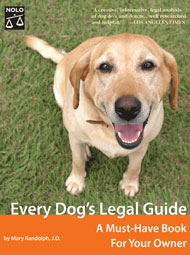Impounding and Destroying Dogs
Many dog control ordinances attempt to give animal control authorities the power to pick up, impound, and sometimes even destroy dogs. But the government's authority is limited by the U.S. Constitution. Here's where the dog's legal classification as "property" comes in handy: The Constitution says the government can't deprive you of your property without giving you due process - that is, notice and a chance to have a hearing. There are, however, important exceptions to this rule: If a dog is unlicensed or running at large, you've probably lost your right to be notified before the dog is picked up or, in some cases, destroyed.
Dogs Running at Large
If a dog's running at large poses an immediate danger to the public, most courts agree that the government has the power to impound and destroy it, without first notifying the owner. If a dog is in the act of attacking a person or livestock, anyone, including government employees, may lawfully do anything necessary to stop it.
Laws may not, however, give animal control authorities excessive power to act without first trying to notify an animal's owner. For example, an Idaho statute that said that any dog "running at large in territory inhabited by deer" was a nuisance and could be killed by a game warden was ruled unconstitutional by the state supreme court.10 Similarly, the Michigan Attorney General issued a legal opinion that in that state, animal control officers were not authorized to kill a dog merely because it was running at large. Only a court could order the dog destroyed.11
FALSE IMPRISONMENT?
If your pet is picked up by overzealous animal control officers and locked in the doggie slammer for the weekend, chances are it will come home smelly, frightened, and hungry. Can you recover from the city or county for its "wrongful arrest" of your innocent dog? Probably not. The law acknowledges only injury to you, not your dog. If, though, the dog becomes sick or is injured because of the wrongful stay at the animal shelter, you may be able to sue successfully.
Remember that you have a chance of winning a lawsuit only if the shelter was wrong to pick up your dog or kept it after you tried to bail it out. If your dog just got caught running around unleashed, and the shelter didn't break any of its own rules about notifying you or releasing the dog when you paid your fine, you've got nothing, legally, to complain about.
Dogs in Owners' Possession
Occasionally, animal control authorities seize a dog that isn't running loose. Only dogs that have bitten someone or, even more rarely, proven to be an incorrigible nuisance are taken from their owners this way. (The "vicious dog" laws that allow this are discussed in Dangerous Dogs.)
Unless a dog is running at large, or an emergency requires immediate action, most courts would agree that an owner who has possession of a dog is entitled to:
- notification before the dog is seized
- notification before the dog is destroyed, and
- a chance to argue, in court, that the dog shouldn't be destroyed.
Most courts, then, would rule unconstitutional any law that allows animal control officials to seize or destroy a dog (in its owner's possession) without giving its owners notice and a hearing.12 The case of Missy, a black Labrador that was reported to have bitten three children, provides a good example. The county Department of Animal Regulation ordered the dog's owner to confine Missy to an enclosed kennel. Several years later, when the owner had to go into the hospital, her son and daughter-in-law took the dog to their house. When Missy allegedly bit another child, the department ordered the dog seized and destroyed.
The county ordinance did not provide for any notice or hearing before destroying a dog, but the county conducted a "courtesy" hearing at the request of Missy's owner. The hearing officer ruled that Missy should be destroyed. A trial judge agreed.
Finally, an appellate court reversed the lower court ruling and declared that Missy "shall live and 'enjoy the noonday sun.' " The county ordinance was unconstitutional, the court said, because it didn't require a hearing before a dog was taken and destroyed. The courtesy hearing was not enough to satisfy the law.13
Enforcement by Humane Societies. Local animal regulations are usually enforced by city and county animal control, health and police departments. Sometimes, however, a humane society or Society for the Prevention of Cruelty to Animals (SPCA) provides animal control services under a
contract with the city or county. Or it may have limited powers - for example, to take charge of injured or abandoned animals, or arrest people at an organized dog fight without first getting a warrant. When it is acting in an official capacity, a quasi-public organization such as a humane society is subject to the same constitutional requirements as any other government agency. That means it must respect dog owners' due process rights, discussed above.
OVERZEALOUS ENFORCEMENT
When officers from the Pasadena, California Humane Society, who enforce that city's leash law, spotted a familiar dog running loose on a golf course, they gave chase. But the dog, a beagle named Toby, dashed home and slipped inside the back door. When the officers caught up, they saw the door ajar; concerned that a burglar might have broken in, they called police, who searched the house. All they turned up was Toby, relaxing on his owners' bed. They shut him in the bedroom.
The humane society officers weren't ready to give up, though; they asked for police permission to go inside and nab Toby. The police agreed, but only because they thought the dog was a stray.
Toby was impounded - for the 15th time in 4 1/2 years - and his owners socked with a $500 fine and two years' probation. The owners then sued, claiming that their constitutional right to be free of unreasonable searches and seizures had been violated. The trial court ruled for the government, but an appellate court took the side of the dog and its owners. Taking Toby from his home without a warrant was not justified by violation of the leash law, a minor offense, the court ruled. Once the dog was safely secured in the house, the officers should have gracefully withdrawn. (Conway v. Pasadena Humane Society, 45 Cal. App. 4th 163, 52 Cal. Rptr. 2d 777 (1996), petition for rev. denied (1996).)

What Happens to Impounded Dogs
So many dogs show up at animal shelters every day - strays, dogs abandoned by their owners, dogs declared vicious by courts - that many facilities are strained to the breaking point. They can't keep all those animals forever; many dispose of dogs after only three to seven days. For a dog there are only four ways out of the shelter: it may be reclaimed by its owner, adopted, sold, or destroyed.
Reclaiming a dog. If your dog is impounded, you can probably bail it out by paying a fine and a per-day charge for its keep at the shelter. If you don't have one already, you'll also have to buy a dog license and get any necessary vaccinations for the dog before it will be released to you.
Finding out that your dog has been picked up may be the tricky part. All shelters are supposed to notify owners whose dogs they impound. Of course, unless yours is an exceptionally smart and articulate dog, the only way the shelter knows you're the owner is to read the dog's identification or license tag (or unless you've outfitted the dog with a permanent ID, a tattoo or microchip; see "Lost and Found Dogs," below). Both you and the dog may be out of luck if it comes to the shelter tagless. Many shelters also have some procedure for making a public announcement about dogs they pick up. This may be posting a list at the shelter, city hall, and police station, or publishing descriptions in the newspaper or, in small towns, even on the local radio station.
If you think your dog may have been picked up, remember that some cities have several shelters. Call all the places to which the dog might have been taken: humane societies, SPCAs, and city and county shelters. Some animal shelters don't give out information over the phone. In any case, it's much better to go in person. Leave a picture or description of the dog at each shelter. And if you don't get a satisfactory answer, keep asking. It's all too common, unfortunately, to hear stories of people who were told on the phone that their dog wasn't at the shelter and found out too late that the dog had in fact been there.
Adopting a stray. Most shelters try, of course, to find new homes for dogs they take in - private homes, rescue groups, or nonprofit agencies that will train them as assistance dogs - but they are usually defeated by the sheer numbers. There just aren't enough owners to go around.
What if someone adopts your dog? You might get it back, if you act quickly and animal control officials are sympathetic. If the shelter made a mistake - didn't notify you although it could have, or let the dog be adopted too quickly - you should have the right to your dog.
If you don't act promptly, however, the dog may be gone for good. A Georgia man, for example, couldn't get back his purebred Keeshond, which was found wandering loose without a license tag and turned over to the humane society. Nine days later, someone adopted it. The owner finally got around to inquiring at the dog shelter; when they told him a dog answering the description had been adopted, but refused to tell him the new owner's name, he sued. The court stood firm for the shelter, ruling that the city had properly used its power to dispose of dogs.14
Selling impounded dogs. Many shelters are allowed, by law, to sell dogs that aren't adopted within a certain time. Who buys stray dogs? Research labs. Allowing public shelters to sell dogs for research is, of course, an emotional and controversial issue. Lawsuits challenging such policies on animal cruelty grounds have failed. But public pressure can be an extremely effective tool; working on legislators to change the laws, instead of fighting them in court, is probably a better strategy.
Some cities, and some states, prohibit their shelters from selling animals for research. California law requires any animal shelter, public or private, that turns dogs over to a research facility to prominently post a large sign, stating that "Animals Turned Into This Shelter May Be Used for Research Purposes."15
Destroying impounded dogs. Shelters across the country must destroy thousands of dogs every year; some shelters are so crowded that they can hold unlicensed dogs only for a single day. Licensed dogs, as mentioned above, usually are granted a few more days. The law often specifies only that the dogs must be destroyed in a "humane manner"; most are given a very quick and humane death by lethal injection. Some laws, however, specifically prohibit certain methods, such as decompression (which inflicts a hideous and painful death).
What to do if your rights are violated. If the government injures or destroys your dog without giving you the notice and hearing required by law, you can sue and collect for your damages.
